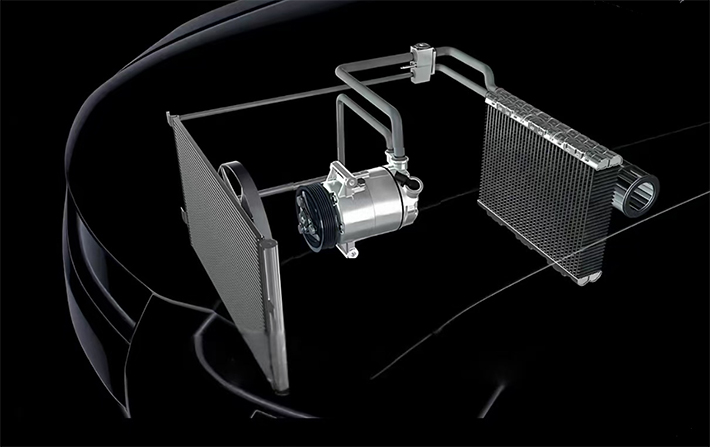How to maintain the car air conditioning cooling system to extend the service life?
2025-03-26
Car air conditioning cooling system is an important part of ensuring the comfort of the car, if not properly maintained, not only will affect the cooling effect, but also may increase fuel consumption and even lead to component damage. Regular maintenance can significantly extend the life of your air conditioning system and ensure its efficient operation. This article will introduce the maintenance methods of car air conditioning cooling system to help owners avoid common problems.

1. Check and replace coolant (refrigerant) regularly
At the heart of the air conditioning cooling system is the refrigerant (such as R134a or R1234yf), which is responsible for absorbing and releasing heat to achieve cooling. If the refrigerant is insufficient or leaked, the cooling effect of the air conditioner will be significantly reduced.
Check the refrigerant pressure: It is recommended to check whether the refrigerant is sufficient every 2 years or after driving 30,000 kilometers.
Pay attention to leakage: If the cooling effect of the air conditioner deteriorates, the refrigerant may leak and need to be repaired in time.
Do not add refrigerant by yourself: The refrigerant needs to be charged by professional equipment. Incorrect operation may damage the compressor.
2. Clean the condenser and heat sink
The condenser and radiator are usually located in the front of the vehicle, which is easy to accumulate dust, leaves and insects, affecting the heat dissipation efficiency, resulting in insufficient cooling of the air conditioner or overheating of the engine.
Regular cleaning: Clean the surface of the condenser and radiator at least once a year with a high-pressure air gun or a soft brush.
Check the fan running: Ensure that the cooling fan can start normally. Otherwise, the high voltage protection of the air conditioning system may stop.
3. Replace the air conditioner filter
The air conditioner filter (pollen filter) is responsible for filtering the air into the car, if clogged, not only affects the air volume, but also breeds bacteria and produces odor.
Recommended replacement cycle: replace once every 10,000-20,000 kilometers or once a year, and shorten the replacement cycle in dusty areas.
Choose a high-quality filter element: activated carbon filter element can better absorb odors and harmful gases.
4. Check the compressor and belt
Air conditioning compressor is the "heart" of the refrigeration system, if the belt aging or compressor failure, the air conditioning will not work properly.
Check belt status: whether there are cracks, slack or abnormal sound, adjust or replace if necessary.
Pay attention to abnormal sound of the compressor: If there is metal friction or abnormal noise when the air conditioner is turned on, it may be a precursor of compressor damage.
5. Run the air conditioner regularly (even in winter)
If the air conditioner is not used for a long time, the sealing rings will be cracked, the refrigerant will leak, and even the compressor will be stuck.
Run at least once a month: Even in winter, you should turn on the air conditioning cooling mode for 10-15 minutes to keep the system lubricated.
Use external circulation ventilation: Avoid long-term circulation resulting in humid and moldy air conditioning system.
6. Prevent mildew and odors in the air conditioning system
The humidity of the air conditioning system is easy to breed mold and produce unpleasant smells.
Turn off AC before stopping and blow dry with high air volume to avoid mold of water in evaporation box.
Use air conditioning disinfectant cleaner: Clean the air duct and evaporation box once a year to remove bacteria and odors.
7. Avoid prolonged exposure to the sun and turn on maximum cooling immediately
After the vehicle is exposed to the sun in summer, the temperature inside the car is very high, and the direct opening of the maximum refrigeration will increase the compressor load and affect the life.
First open the window for ventilation: after driving for a few minutes, turn on the air conditioning and gradually cool down.
Rational use of internal and external circulation: first external circulation to discharge hot gas, and then switch internal circulation to improve cooling efficiency.
Summary
The maintenance of the car air conditioning cooling system is not complicated, but requires regular attention from the owner. Through reasonable maintenance, it can not only extend the service life of the air conditioning system, but also ensure the cooling effect and ride comfort. If you find abnormal cooling, abnormal sound or odor of the air conditioner, it is recommended to check and maintain it as soon as possible to avoid small problems turning into major failures.